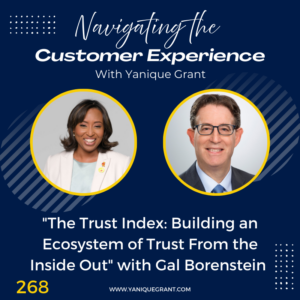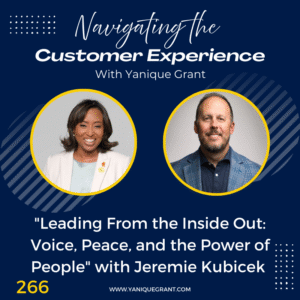This episode with Yanique Grant will spend some time speaking about business culture, a little bit about leadership and also customer experience. According to the business dictionary online, business culture is the module or style of business operations within a company, the culture determines how different level of staff communicate with one another as well as how employees deal with clients and customers, culture is very important.
Highlights
As a Customer Experience Strategist and a Coach in customer experience and in the experience that she as garnered over the last 8-10 years, many companies have asked her, “Yanique, how can we improve our customer experience? What do you think is the main reason why customer experience is so poor?” and her number 1 reason is always the leadership, “Are you walking the talk? Are you showing behaviors and attitudes that your employees can emulate? D you have systems in place that reward employees for great behavior, for great interaction with your customers?” Many of the great brands globally believe that customer experience is the backbone of their business and it’s the number one differentiator because no business has a monopoly in what they’re doing in terms of the product or service they offer, it’s guaranteed that somebody else out there that sells a book or somebody else out there that’s a health coach or somebody else out there that is repairing a car but what is going differentiate the experience is the quality of the experience, the things that happing in the experience, when things go wrong how does that individual recover the experience with the customer and that’s why culture is very important to your business growth and your business development.
Yanique stated that she will share some basic things that she believes should be incorporated if you are clearly serious about your business and you want to improve on your culture. Throughout her career as a leader, managers have developed culture management systems around 5 key points and they are:
The right vision and unique ways to constantly reinforce why we do what we do and it goes back to walking the talk. As the leader in the organization, you need to know what kind of culture you want demonstrated in your organization and find unique ways to constantly reinforce it so that people can see it everyday, it’s similar to parenting. You hire all these people and they may have the right attitude and the necessary competencies to complete the job on a daily basis but they all socialize differently, coming from different backgrounds, having different life experiences and now they are all working together towards a common vision and goal but they are not going to be able to miraculously come on day 1 or day 3 or day 10 or day 50 and just know exactly what to do and this is why as a leader it is important to constantly reinforce what it is that they are doing, why they are doing what they are doing and how is it going to benefit them. Yanique stated that she is a big supporter of leaders in an organization who have a vested interest in the development of their employees, so if your business is going to grow and your bottom line has increased immensely and your shareholders are very happy, your employees should actually see an improvement in the quality of their lives as well because if the business grows, the employees should be growing as well not just professionally but they should also be growing in a way that they can advance their life. Point number 2 is simple focus systems like focus scorecards to align key managers, so you need some level of assessment and measurement because people will do as they feel like doing and it’s very important to have a structure in place where people are measured and assessed consistently. Reward systems that drive the right behavior is number 3 because it’s so important for people to know that when they do something right, they are commended for it, they are rewarded for it. Reward doesn’t mean you have to give them money because many people are not driven by money, it could be that the team gets a weekend away or maybe they get a book or a gift certificate so you have to take time a leader to get to know your team members and figure out what it is that they like and what they don’t like because everyone isn’t motivated by money. Effective coaching tools that help associate and live the values and help associate to get the results, so coaching is very important because all of these people are new to this experience of a corporate culture and customer experience and having that mindset where everything that you do is driven by the customer in mind first. Coaching is very important to that process because if that’s not how the individual naturally thinks or naturally processes information, they are going to need help in terms of guiding them coaching them in that direction. Point number 5 is constant process improvement; now quality customer experience is about doing it right the first time, every time and so consistency is key. Customers can be unforgiving at times so you can have a customer who has been your customer for 20 years and the one time you mess up, they just blow the roof and you simply say to yourself, “I’ve been doing business with you for 19 plus years, we’ve done it right the first time, every time and this one time, can’t you just cut us some slack?” Unfortunately, some customers don’t give you that opportunity and that’s why constant process improvement will help to drive consistency of those interactions and behaviors with your team members and customers so it will minimize the errors and risks that may come about in creating problems with your customers. It is so important to ensure that you have a good business culture. Leadership is critical to cultural development and has much as many leaders may want to shy away from the opportunity or responsibility of cultural development; it is very much apart of your daily interactions, most leaders should have a scoring that they are assess on by the board of an organization in terms of whether or not the culture of the organization has improved, because culture is not just the HR department’s responsibility, HR is just one small function of culture in a business and it’s very important for the leader to recognize that you drive HR processes and the department, you drive the marketing, you drive the accounts, you drive the culture because the culture is the interaction of the people with each other and as a result of that their interaction with your external customers. Yanique stated that one thing that she strongly believes as it relates to culture, culture can often be mistakenly thought of has a vague concept, like the nice to things but it’s not just the nice to things, it’s the things that drive the behavior and interaction and if it’s not driven correctly, it can lead to you having a lot of service issues and service issues can cause a lot of money especially if you’re losing customers. In customer experience no business wants a customer never to come back, they want their customers to repeat their business over and over again so that you have customer lifetime value and you can listen back to many of the previous episodes where they have had guests who came on who are experts in the customer lifetime value calculation and the importance of ensuring that you retain your existing customers because it costs so much to get a new customer. You want to focus on critical que behaviors in your organization so that you can change the existing behaviors, you won’t be able to change everyone but the aim is to try and do as much as possible to get some form of improvement within the organization. If you culture is wrong, it can make or break your organization very easily, so you want to make sure that your leaders in your organization understand the importance of culture. We hope that persons who are listening to this podcast understand that the employee in an organization is really driven by the behavior and attitudes that your leaders demonstrate and they watch you every single day even when you think they are not watching, they are watching, they are forming an impression and they are forming a perception, they observe how you interact with the customers, they observe how you interact with the employees. If you get upset with an employee because they did something to satisfy a customer’s need, it is going to drive fear into other employees who have observe because now they are not going to feel as confident to step out on the limb and satisfy a customer’s need because they observed you reprimanding Bill last week for dealing with a customer’s issue and in Bill’s mind, Bill was able to satisfied that customer’s need and the customer left happy but in the bosses mind, he should have not taken that decision on his own and with that in mind, Tom who observed what happened is not going to take that action on their own next and if you’re no there then that delays the whole service experience. Service recovery is the backbone of customer experience and it’s most effective at the first point of contact, if you customers recognize that you’re not taking their business seriously then they are going to move their business to somewhere that that company values their business and appreciate their business. It is so important as the leader to really recognize what requires improvement and understand your role in that entire process. We are at the beginning of second quarter in 2017, for those of you listening to this podcast; Yanique is going to encourage you to think about your own business, whether you’re the business owner, whether you’re the business leader, whether you’re a manager in the organization and even if you’re an employee, you can contribute as well. If your business is not the type of business that your customers are walking up and down everyday speaking positive things about your business or people are not clambering to become employees of your business because you have such an amazing culture then there is opportunity for improvement within your business. If your answer to any of these questions, made you sit down and think and say, “hmm, maybe we could improve in this area or maybe we could improve in that area.” Yanique is challenging you to make that improvement by the end of this month. It is so important to focus on what needs to be improved and then take the steps to improve them, everything can’t be done overnight and culture is not something that changes within a month or within 3 months, it takes time. We encourage you whether you work with an external consultant and bring them in as a subject expert to help you business grow on a consistent basis or if you chose to do it on your own internally, whatever your strategy is you have to make an effort to do something. Sitting down and doing nothing is not going to achieve the results that you want to get and because your customers are the reason why you are in business, you have to ensure that you empower your employees, equip them with the necessary tools and tools don’t always mean the system that they are using or the procedures they need to follow but tools also mean the interpersonal skills that they require in order to feel confident and empowered to deal with your customers. We challenge you to do something differently than what you’re doing now so that you can improve on your business and improve on business culture. What kind of culture do you want to have, do you want when people call your business name in public the positive thoughts or the positive sayings that come about are, “Yes, that company is really great, their employees are very friendly, they are knowledgeable, they operate with speed, my deliveries or my orders are always on time, they can answer any question that I ask, they are very efficient, they are very responsible, they are reliable.” Those are adjectives that can only come about if your culture is one that has values that support the things that people are saying. We challenge you as a owner, a leader, a manager, as an employee to go back into your organizations and look for opportunities that you can change one thing that can contribute to a positive culture in your business.
Links




